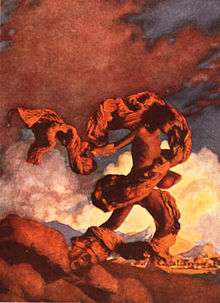Thersander
In Greek mythology, the name Thersander /θɜːrˈsændər, θɜːrˈsɑːndər/ (Greek: Θέρσανδρος) refers to several distinct characters, the most prominent of whom is Thersander the son of Polynices.
Thersander, son of Polynices
In Homer's Iliad, Thersander was one of the Epigoni, who attacked the city of Thebes in retaliation for the deaths of their fathers, the Seven Against Thebes, who had attempted the same thing. He was the son of Polynices and Argea.
Thersander may have bribed Eriphyle with the robe of Harmonia so that she sent her son, Alcmaeon, to fight with him. His father did the same with Harmonia's necklace to convince her to send her husband with the original attackers. The attack of the Epigoni was successful, and Thersander became the king of Thebes.[1] Thersander intended to fight for the Greeks during the Trojan War, but was killed by Telephus before the war began, while the Greeks had mistakenly stopped in Mysia. He was succeeded by his son Tisamenus, whose mother was Demonassa.[2]
Pindar refers to Thersander as gaining honor after Polynices' death and preserving the house of Adrastus for later generations.[3]
Other characters
Thersander also refers to:
- Thersander, a son of Sisyphus, brother of Glaucus, Ornytion and Almus.[4] His own sons were Haliartus and Coronus, eponyms of Haliartus and Coronea respectively,[5][6] and also Proetus, himself father of Maera who was known to have died a maiden.[7]
- Thersander, one of the Heracleidae, son of Agamedidas. His twin daughters Anaxandra and Lathria married the twin sons of Aristodemus, Procles and Eurysthenes[8]
- Thersander of Crete, father, by Arethusa, of a son Hyllus (not to be confused with the son of Heracles). Hyllus was killed by Aeneas in the Trojan War.[9]
References
- ↑ Apollodorus. Library, 3.7.2.
- ↑ Pausanias. Description of Greece, 9.36.1.
- ↑ Pindar, Olymp. 2.42-45.
- ↑ Pausanias, Description of Greece, 2. 4. 3
- ↑ Pausanias, Description of Greece, 9. 34. 7
- ↑ Stephanus of Byzantium s. vv. Haliartos, Korōneia
- ↑ Pausanias, Description of Greece, 10. 30. 5
- ↑ Pausanias, Description of Greece, 3. 16. 6.
- ↑ Quintus Smyrnaeus, Fall of Troy, 10. 30
| Regnal titles | ||
|---|---|---|
| Preceded by Laodamas |
Mythical King of Thebes | Succeeded by Tisamenus |
